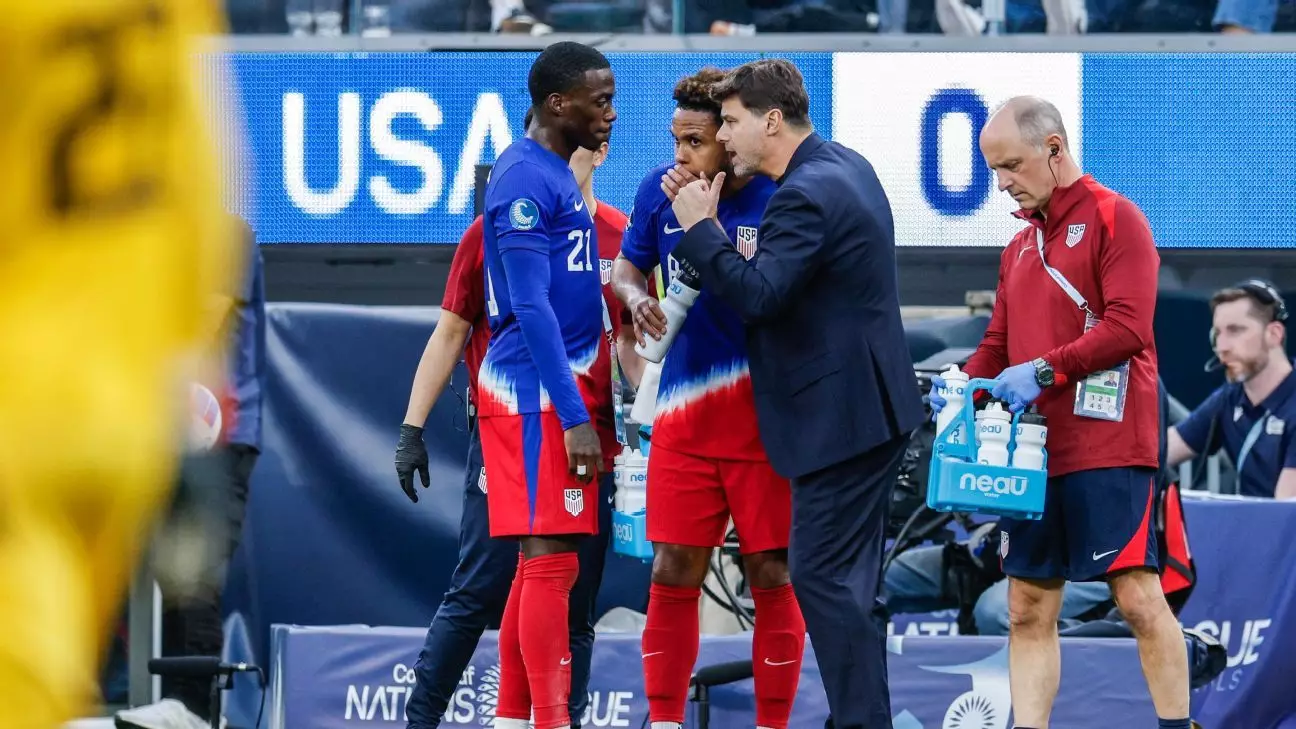The recent semifinals of the Concacaf Nations League served as a glaring reminder of the challenges facing the United States men’s national soccer team (USMNT). Manager Mauricio Pochettino’s discontent was palpable after his side’s unexpected defeat to Panama, encapsulating the growing concern about the team’s direction. Pochettino didn’t mince words, bluntly criticizing his players’ complacency. “We are USA,” he remarked, emphasizing that wearing the national team jersey isn’t an automatic ticket to success. In true soccer fashion, Pochettino highlighted a fundamental misalignment between attitude and effort—a sentiment that’s become too resonant in American soccer.
This kind of disappointment is deeply rooted in a culture that often takes success for granted, especially when it comes to international soccer. The expectation to dominate on the field because of a legacy that sees the U.S. as a powerhouse in sports is misguided. In official competitions, the team appears to believe that reputation alone suffices, neglecting the hard work and dedication required to turn possession into goals.
Possession Without Purpose
Possession statistics can be deceiving, and the USMNT’s 66% ball control against Panama epitomizes this phenomenon. The truth is that while the U.S. monopolized the ball, they were lethargic and lacked incisiveness. With an xG of just 0.68, the team struggled to translate possession into meaningful chances. While Panama, with a meager xG of 0.10, seized a remarkable opportunity to capitalize on a late-game mistake, the sharp contrast in efficiency underscores a critical failing in the U.S. approach: you can dominate the ball, yet fail to dominate the game.
Pochettino’s disappointment resonated through his analysis of the first half, where the team’s lack of aggression was palpable. It’s a bitter pill to swallow, especially when the players seemed content with sideline passes and safe plays, devoid of creativity or aggression in their play. The U.S. really needs to refocus on transitioning from a defensive mindset into a more ambitious and risk-taking strategy if they want to reclaim their standing on the international stage.
The Missed Opportunities
The 82nd-minute denial of Patrick Agyemang by Panama’s goalkeeper Orlando Mosquera is symbolic of the U.S.’s broader struggles. Here was a golden opportunity that could have shifted the momentum for the team, yet once again, they faltered in execution. Pochettino faced scrutiny, particularly regarding his tactical choices—or lack thereof. The absence of creative sparks like Giovanni Reyna or Diego Luna when the situation desperately called for innovation has raised eyebrows among fans and pundits alike.
Waiting until extra time to implement change not only reveals a lack of urgency but also an underlying hesitation that has plagued American soccer. The team’s mindset must evolve from preservation to ambition. If the aim is to compete with top-tier teams, every moment in the match becomes essential, and decisions regarding player substitution must reflect that urgency.
The Road Ahead: A Call for Aggression
As the U.S. prepares to face Canada in a third-place match, Pochettino’s call for more scrappiness becomes increasingly vital. The emphasis on aggression isn’t simply about physicality—it’s about attitude, a relentless pursuit of victory. Without embracing risk, the U.S. squad will continue to remain stagnant. The players must understand that it isn’t enough to “play safe” for results; they must embrace a mindset where they can explore attacking possibilities and engage in 50-50 duels with conviction.
For the U.S. to step out of the shadows of disappointment, they must adopt an approach that matches their ambitions. Anything less equates to a disservice to their legacy. It’s high time the national team realizes that respect in soccer must be earned through grit, creativity, and risk-taking. It’s about time they stop relying on a name and start redefining what it means to be the USA on the soccer field.


Leave a Reply